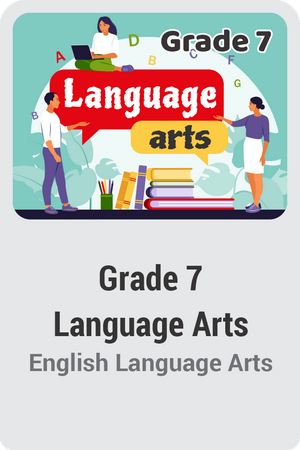
Course Overview:
Through a theme of finding their voice, students in the Grade 7 Language Arts course study the ways in which word choice and sentence structure contribute to developing the author's perspective. Students continue to develop the reading, writing, language, and speaking/listening skills necessary for success in college, career, and beyond with a strong connection to civics throughout the centuries. Students closely examine voice, purpose, diction, syntax, and rhetoric in historical speeches, informational texts, and classic and contemporary literature through guided readings, interactive practice, and formal assessments. They also grow their narrative, informational, and argumentative writing skills through the repeated practice of planning, drafting, revising, and editing their written work.
Prerequisites:
Grade 6 Language Arts
Required Materials:
Student-Supplied Resources
Students need to supply the following materials to complete the coursework.
Required:
- Disk space on your computer as well as an external device to back up your files (flash drive, external hard drive, etc.)
- Word processing program (Microsoft Word or similar)
Students will read an independent reading selection in Segment Two from a list of options provided by instructors.
*Students are responsible for obtaining their independent reading selection.
School-Supplied Resources:
Students will explore excerpts from the following texts:
- “The Tell-Tale Heart” by Edgar Allan Poe
- Alienated by Ken Preuss
- The Count of Monte Cristo by Alexandre Dumas
- “The Monkey’s Paw” by W.W. Jacobs
- Assorted speeches, poems, and historical texts
Free Downloads:
- Java
- Windows Media Player
- Apple iTunes
Syllabus:
Segment One:
- Reading Comprehension/Informational & Expository Writing
- Explaining author's purpose through diction and syntax
- Exploring connotation and denotation
- Examining the ways literary elements interact
- Understanding the effect of unreliable narrators
- Analyzing plot structure
- Determining one or more themes in literature
- Learning the correct usage of hyphens
- Uncovering word meanings through context clues
- Discovering tools for enhancing language
- Composing powerful paragraphs
- Determining the central idea of a text
- Recognizing text features
- Writing effective summaries
- Identifying the structure of informational texts
- Distinguishing between organizational patterns
- Reading for research purposes
- Avoiding plagiarism Citing sources correctly
- Formatting the Works Cited page
- Using signal phrases and transitions in academic writing
- Writing effective informational introductions, body paragraphs, and conclusions
- Formulating thesis statements for academic writing
- Using precise language and domain-specific vocabulary
- Creating different types of sentences
- Editing and revising
- Identifying and correcting logical fallacies
- Using semicolons effectively
- Determining word meaning through affixes and root words
- Defining and analyzing author's perspective
- Writing compare and contrast paragraphs
- Using colons effectively
- Identifying and analyzing allusions in non-fiction and fiction
Module 01: Back to Basics
- 01.00 Back to Basics Checklist
- 01.00 Language with a Purpose
- 01.02 Literary Elements Interact
- 01.03 How Theme Develops
- 01.04 Connect with Hyphens
- 01.05 Tools for Finding Meaning
- 01.06 Writing 101
- 01.07 Get the Gist
Module 02: Immersed in Information
- 02.00 Immersed in Information Checklist
- 02.01 Reading Informational Text
- 02.02 Researching and Organizing Information
- 02.04 Responsible Research
- 02.05 Intriguing Intros
- 2.06 Show Some Support
- 02.07 Wrap It Up
- 02.08 Sentence Switch Up
- 02.09 The Final Touches
Module 03: Analyze This
- 03.00 Analyze This Checklist
- 03.01 Faulty Fallacies
- 03.02 On the Hunt for Fallacies
- 03.03 Semicolon Strategies
- 03.04 Helpful Affixes and Roots
- 03.05 Varying Viewpoints
- 03.06 Conquering Colons
- 03.07 The Power of Allusions
Segment Two
- Reading Comprehension/Argumentative Writing/Narrative Writing
- Analyzing rhetorical appeals and devices
- Responding to text-based prompts
- Identifying elements of an effective claim and counterclaim
- Effectively supporting a claim Organizing an effective argument
- Determining the central/main idea
- Using elaborative details
- Understanding how figurative language affects meaning and tone
- Interpreting figurative language
- Finding literal and figurative meaning
- Comparing and contrasting texts
- Using context clues to paraphrase poetry
- Identifying characteristics of poetic forms
- Explaining how figurative language impacts tone
- Identifying elements of drama
- Clarifying point of view and perspective
- Tracking the development of conflict and theme
- Revising for parallel structure
- Using digital media to create a book review
- Identifying narrators and points of view
- Planning a narrative based on a prompt
- Writing a narrative that clearly reflects plot structure
- Using narrative techniques to enhance creative writing Incorporating temporal words and phrases effectively
- Understanding active and passive voice
- Using verbs to achieve a certain mood
Module 04: Fighting Fair
- 04.00 Fighting Fair Checklist
- 04.00 Fighting Fair Pretest
- 04.01 Recognizing Rhetoric
- 04.02 Rhetoric in Action
- 04.03 Arguments 101
- 04.04 Organize Your Argument
- 04.06 A Strong Introduction
- 04.07 Build a Convincing Body
- 04.08 Closing It Down
- 04.09 Practice Makes Perfect
Module 05: Looking Into Literature
- 05.00 Looking Into Literature Checklist
- 05.01 Pondering Poetry
- 05.02 Shall I Compare Thee?
- 05.03 The Right Place at the Right Time
- 05.04 Two Sides to Every Story
- 05.05 Lessons Learned
- 05.06 Practicing With Parallel Structure
- 05.08 You Be the Judge
Module 06: Narrative Know-Hows
- 06.00 Narrative Know-Hows Checklist
- 06.01 Need to Know About Narratives
- 06.02 Begin Your Story
- 06.03 Narrative Techniques
- 06.04 Body Language
- 06.05 Raise Your Voices
- 06.06 Transitioning to the End
- 06.07 Moody Verbs


